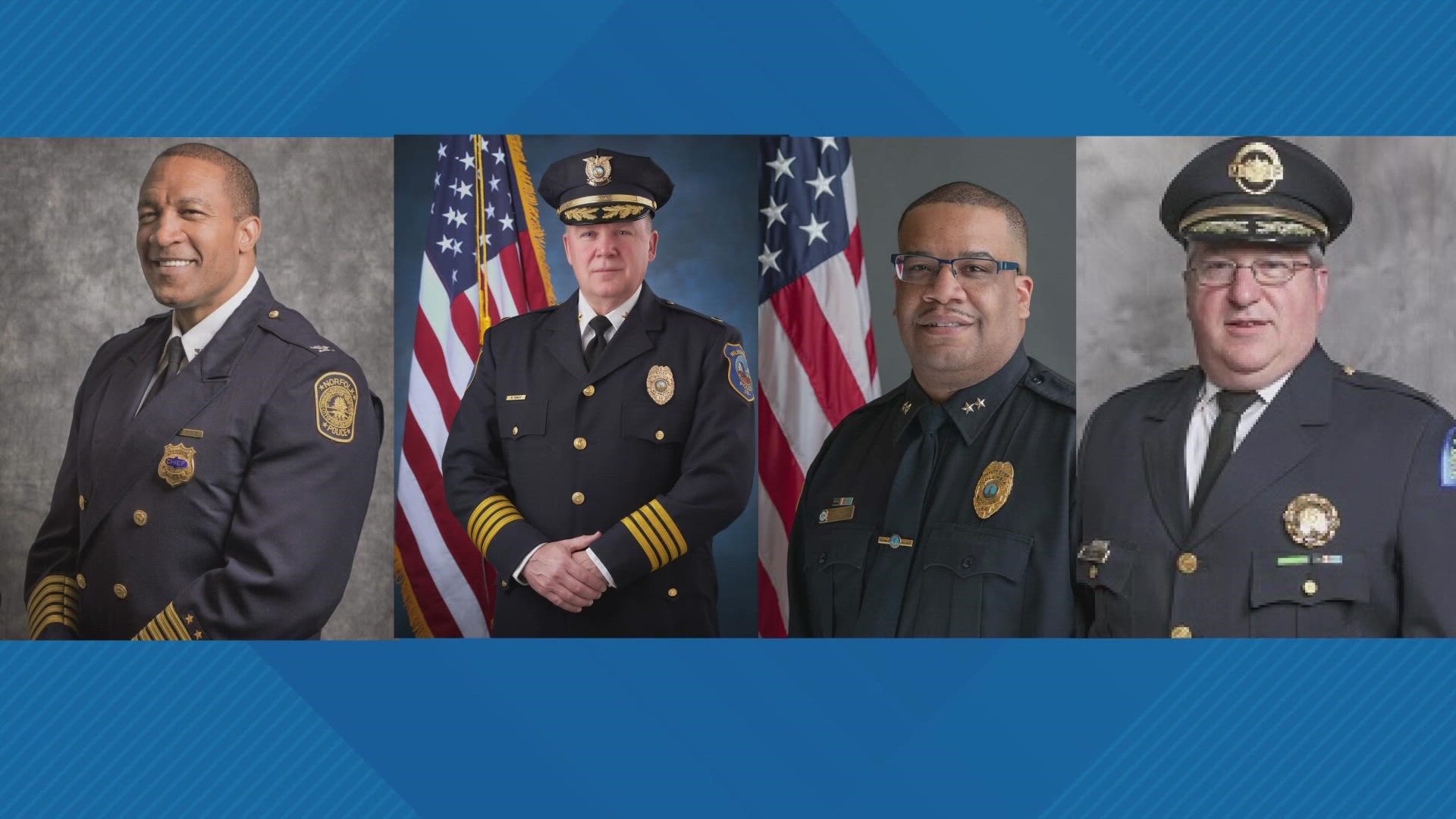ST. LOUIS — Four finalists to become the next St. Louis police chief include three external candidates and one internal candidate.
The finalists were Chief Larry Boone of Norfolk, Virginia; Deputy Chief Melron Kelly of the Columbia, South Carolina Police Department; Interim St. Louis Police Chief Michael Sack and Chief Robert Tracy of Wilmington, Delaware.
“By bringing St. Louisans into the selection process, we are putting the public back in public safety,” said Mayor Tishaura O. Jones. “I look forward to hearing more from each of the finalists about their vision to keep St. Louis safe for our families and visitors.”
The release of the names comes about 24 hours before a 6 p.m. town hall City of St. Louis Mayor Tishaura Jones' office planned for Tuesday at Vashon High School for the public to meet the finalists.
The mayor’s administration had a couple of days with the names of the finalists before narrowing them to a field of four in time for the public meeting.
The public is going to have about 24 hours to research everything it can about the candidates to ask questions.
“By bringing St. Louisans into the selection process, we are putting the public back in public safety,” Mayor Tishaura Jones said in a press release. “I look forward to hearing more from each of the finalists about their vision to keep St. Louis safe for our families and visitors.”
Mayor Jones' office released the four finalists and some biographical information about the candidates Monday afternoon.
All four candidates are men and they all have master’s degrees. The youngest is Kelly, who is 45, Sack is the oldest at 60 and the other two are 58.
Boone recently retired as the police chief in April. In an interview with 13 NewsNow in Virginia, Boone said gun violence definitely played a role in his decision to end his tenure as chief.
"I came to the point that there is very little I can do at this point to impact gun violence," Boone said in April.
Since retiring, Boone has also been named a finalist for the police chief job in Cincinnati. He spoke to the public at City Hall in Cincinnati last week.
In January, Robert Tracy, who oversees the police department in Delaware’s largest city, was given a vote of no confidence by the Wilmington city council. According to NPR/PBS affiliate WHYY, the resolution stemmed in part from an appearance at a public safety committee meeting where he discussed the department's lack of diversity among leadership positions.
The biographies provided by Mayor Tisharua Jones' office are as follows:
Chief Larry Boone of Norfolk, Virginia

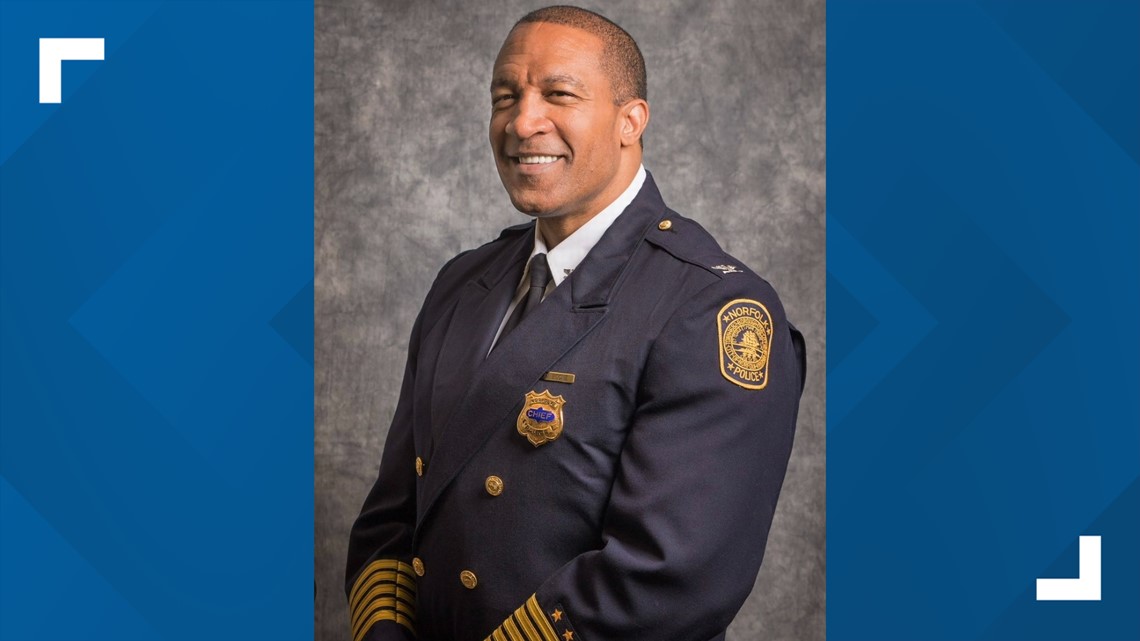
Experience:
Worked for the Norfolk Police Department since 1989.
During his career, he has served in the Patrol Division, Metro-Tactical Unit, Canine Unit, the Office of Professional Standards, and the Gang Suppression Unit.
After 26 years of service, he was appointed Deputy Chief of Police on September 22, 2015.
He was appointed Chief of Police December 1, 2016.
Created the Office of Community Relations, which planned more than 20 community outreach initiatives and the department’s signature programs including Cops and Curls, Cops and Kids Eating (CAKE), Police Leadership Unveils Success (PLUS), and Clergy Patrol, which have been nationally recognized by the International Association of Chiefs of Police, Police Executive Research Forum (PERF), FBI Law Enforcement Bulletin, and the Christian Broadcasting Network.
Boone co-authored the article 'Building Social Capital - Youth Engagement in “At-Opportunity” Communities', International Association of Chiefs of Police, Police Chief Magazine – Youth Engagement 87, no.8 (August 2020): 52–57, highlighting the partnerships.
Boone also authored the excerpt “Policing in the 21st Century”: What Does the Future of Policing Look Like? Introduction to Policing: Perceptions Versus Reality (Revised First Edition) by Chernoh Wurie, Box 12.1 (2021) 257–258.
In 2021, Chief Boone served as a member of the Commission on Accreditation for Law Enforcement Agencies, Inc. (CALEA) Executive Director Regional Advisory Group.
Education:
Bachelor of Arts degree from Georgia Southern University and Master of Public Administration from Old Dominion University in Norfolk, Va.
2020 graduate of the CIVIC Leadership Institute (CLI) Executive Program; 2018 graduate of the 41st Session of the FBI’s National Executive Institute; 2010 graduate of the 241st Session of the Federal Bureau of Investigation’s National Academy in Quantico, Virginia; 2009 graduate of the Professional Executive Leadership School (PELS) – University of Richmond, Virginia,
Memberships/honors:
Subject matter expert for the Collaborative Reform Initiative Technical Assistance Center (CRI-TAC), which provides technical assistance to meet the needs of state, local, tribal, and campus communities throughout the United States; regional law enforcement executive representative for the Eastern District of Virginia (EDVA) Project Safe Neighborhood (PSN) Grant Committee that makes funding decisions about programs and initiatives that support EDVA’s PSN strategy to combat violent crime.
Recipient of the 2019 G.W.C. Brown Legacy Education Fund and Alpha Phi Alpha Fraternity, Inc. Alpha Phi Lambda Chapter Humanitarian Award; 2018 NOBLE Attorney General Eric Holder Leadership Award; Virginia Association of Chiefs of Police 2018 President’s Award; member of the Virginia Association of Chiefs of Police, the International Association of Chiefs of Police, the Federal Bureau of Investigation’s National Academy Associates and the National Organization of Black Law Enforcement Executives (NOBLE).
Boone played football for Georgia Southern University (Division I-AA), winning two national titles (1985, 1986).
Gubernatorial appointments to the Virginia State Crime Commission and the Virginia African American Advisory Board.
Age: 58
Family: Native of inner-city New Brunswick, New Jersey
Other info from bio:
Boone was born into a non-traditional family that included four siblings. He lived in a “bleak and chaotic environment” until his adolescent years where his experiences subsequently lead to “unfavorable encounters with law enforcement.” As a result of these incidents, Boone moved to Northampton County, North Carolina to live with his grandparents.
The citizens of Norfolk refer to Chief Boone as a “Different Kind of Chief”.
“Unlike his peers, Boone’s inner-city youth experiences shaped his mental marathon of endurance to withstand difficult challenges in the pursuit of a better life that served others,” according to the bio. “Boone strives to improve and build long-lasting relationships with the community through authentic engagement.”
Deputy Chief Melron Kelly of Columbia, South Carolina Police Department

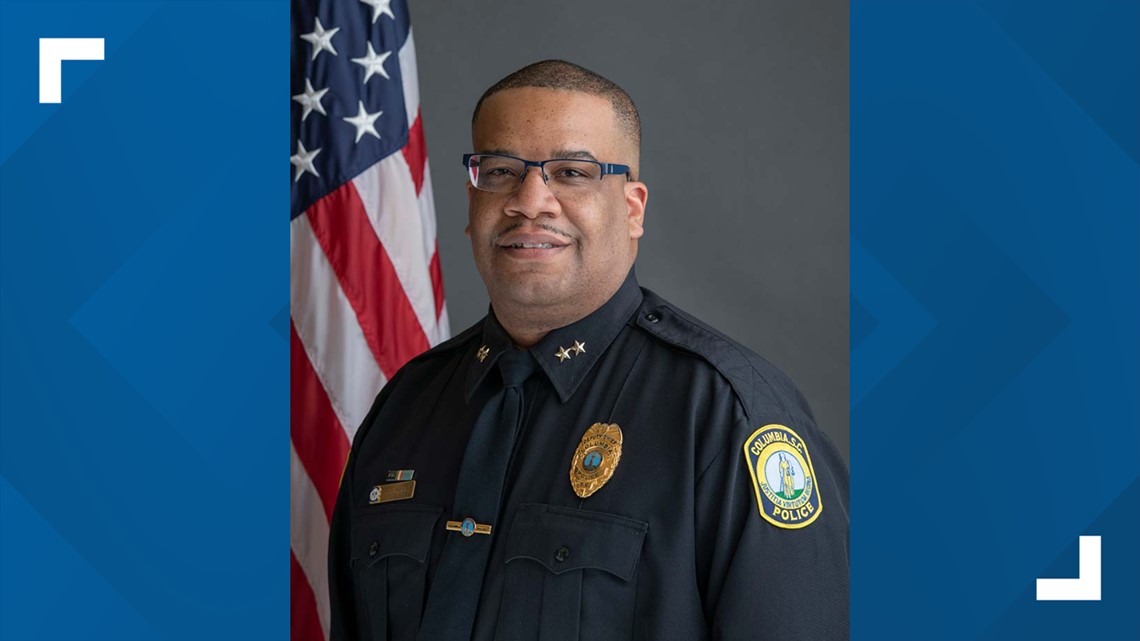
Experience:
Began career in law enforcement in 1999.
Serves as second-in-command at the Columbia, South Carolina Police Department. Currently, he is the commander of the Operations, Special Services and Administrative Bureaus, which include the Recruiting Division, the Patrol/Regional Divisions, the Criminal
Investigations Division, and the Public Information /Media Relations and Marketing Departments.
Kelly’s first assignment at the Columbia Police Department was as a Residential Officer in the Waverly and Gonzales Gardens Communities. He’s also served in the Narcotics Division as an Investigator before being promoted to sergeant.
As a lieutenant, he oversaw the Gang/Narcotics Unit.
As a captain he served the department’s North Region
As a major he oversaw patrol operations.
Education:
Graduated from the South Carolina Criminal Justice Academy
Bachelor’s Degree from South Carolina State University
Master’s Degree from the University of Louisville.
Memberships/honors:
Member of the FBI’s National Academy Class 270, The Southern Police Institute Alumni Association, Serve and Connect, Sowing Seeds, The Columbia Community Relations Council, Omega Psi Phi Fraternity.
Was recently named as a Riley Diversity Fellow by the Riley Institute at Furman University’s Diversity Leadership Initiative (DLI).
Attended the DEA Drug Unit Commanders Academy 62nd Session, Southern Police Institute 124th Administrative Officers Course, PERF Senior Management Institute for Police 74th Session
Age: 45
Family: None provided
Other info from bio: None provided
Interim St. Louis Police Chief Michael Sack

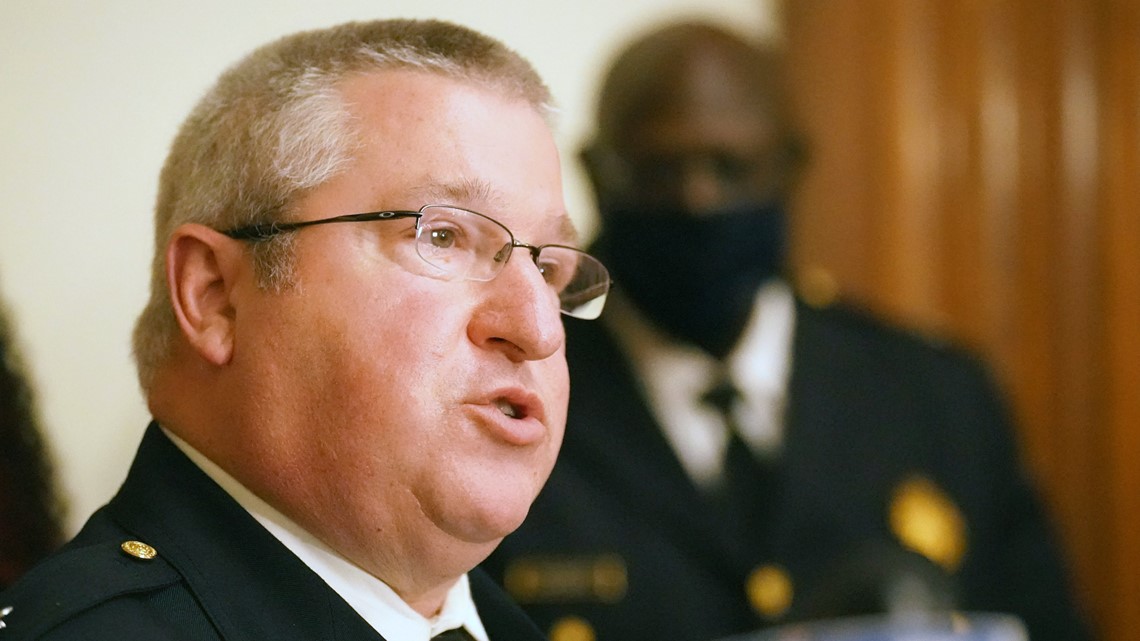
Experience:
Joined the St. Louis Police Department in 1994.
Worked in District Four, the Central Patrol Detective Bureau, and the Special Services Division.
Promoted to Lieutenant in 2007 and was assigned to the District Seven until he was promoted again in 2008 to the rank of Captain.
As a Captain, Sack served as the Commander of Crimes Against Persons.
In 2015, Sack was promoted to Major and served as the Commander of the Central Patrol Division until he was transferred to command the Bureau of Professional Standards.
In 2019, Sack was promoted to the rank of Lieutenant Colonel and remained Commander of Professional Standards until October of 2021, when he was transferred to command the Bureau of Community Policing.
In May 2022, Mayor Tishaura Jones appoints Sack as the Interim Chief of the St. Louis Police Department.
Education:
1st Lieutenant in the Army Reserves
Bachelor’s degree in Communication/ARTS from Cardinal Glennon College.
Two Master’s degrees; one in Divinity from Kenrick Seminary and one in Business and Organization Security Management.
Memberships/honors:
Sack has received two Officer of the Year Awards, three Awards of Excellence, and one Chief’s Letter of Commendation.
Graduated from the FBI Academy in 2014.
Age: 60
Family: None provided
Other info from bio: None provided
Chief Robert Tracy of Wilmington, Delaware

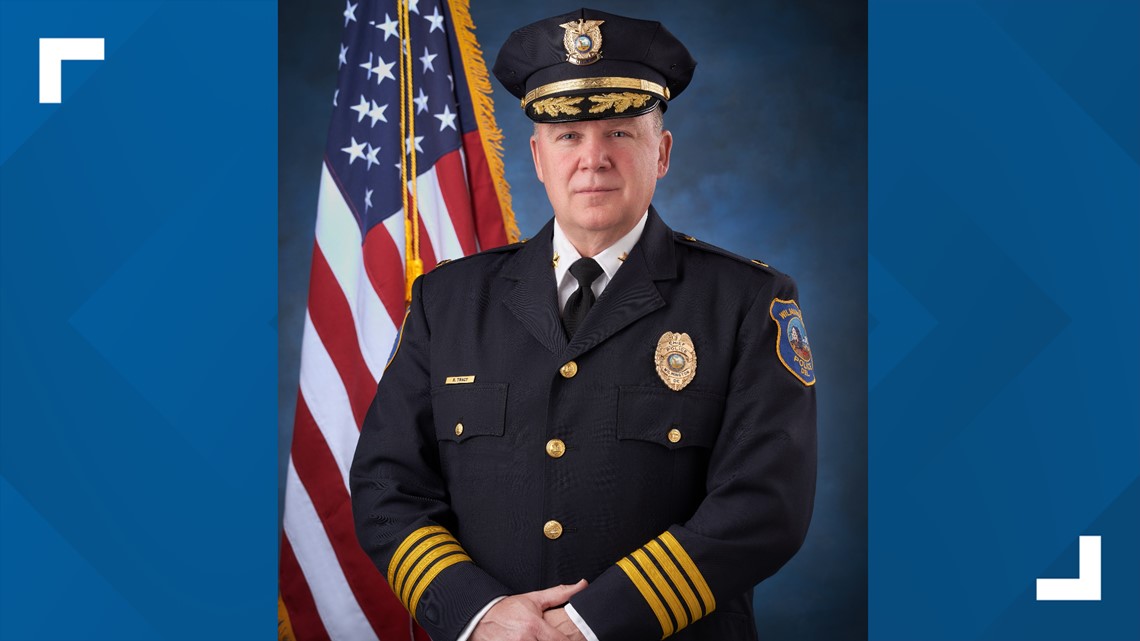
Experience: Served as Chief of Police for the City of Wilmington, Delaware since April 14, 2017.
More than 30 years in law enforcement, including time served with the New York and Chicago police departments.
While with the NYPD, Tracy served as commander of a Firearms Suppression Division for NYPD, commander of the Firearms Investigation Unit, worked with Organized Crime Investigation Division and ATF/NYPD Joint Firearms Task Force, led the Violent Felony Squad, the NYPD/U.S. Marshal Regional Task Force, and supervised the Bronx/Manhattan Warrant Squads.
In Chicago, Tracy was the principal Crime Control Strategist.
In Wilmington, Tracy created the CompStat process and developed the department’s methods for Intelligence-Based Policing, implemented Group Violence Intervention in conjunction with the National Network of Safe Communities and John Jay College of Criminal Justice in New York City.
Education: Masters in Public Administration from Marist College and a Bachelor of Arts in History from SUNY, Empire State College
Memberships/honors: ATF National Crime Gun Intelligence Governing Board; the Police Executive Research Forum (PERF); the International Association of Chiefs of Police/Private Sector Liaison Section; the Delaware Police Chiefs’ Association; and the Delaware Governor’s Juvenile Justice Advisory Group
Age: None provided
Family: Born in the Bronx, New York City, NY, married with five children.
Lives in Wilmington, Delaware.
Other info from bio: None provided.
____________
Questions for the finalists can be submitted in an online form only. Tuesday is the only town hall with the candidates currently planned.
On Friday, a spokesman for the Department of Public Safety Director Dan Isom received the names of six finalists for the job and four finalists were selected over the weekend.
“I’d like to see a police chief who will police the police. I think that’s important,” said Adolphus Pruitt, the President of the St. Louis NAACP.
Pruitt also thinks the city’s next Commander in Chief must “build community relations and help bridge the gap between citizens and police officers.”
“Having a knowledge base and drive to interact with the community, build community programming and be a face in the community I think is really essential,” said Pruitt.
Other local organizations have their own hopes for the new chief.
“Our main concern is we really want to stop the violence,” said Sheila Price.
Price is the Vice-President of Mothers Advocating Safe Streets.
“We want to get the drugs off the street. We want to address education. We want to find something for kids to do with their so-called spare time,” added Price.
The Ethical Society of Police has criticized the process, saying it's not the transparent selection process Jones promised when she re-started the police chief search a year ago.
The organization, which represents primarily Black officers, issued a statement Dec. 1.
“ESOP’s friends in the community have come to us with the same question regarding the SLMPD Chief search – where has the transparency been in this process?” according to a statement the organization issued. “The Chief of Police greatly impacts the citizens who reside within the city as well as business owners. Why hasn’t the public been given information about the candidates before now, so they can do their own research? Why has this long process been so secretive?
The organization also called on residents to attend the town hall or submit questions through the city’s website.
“If you are not assisting with the solution, you are made into the excuse for the process to continue behind closed doors,” it wrote. “This town hall is a start, but the public needs more transparency every step of the way until the chief is selected. Let’s show them St. Louis citizens want and deserve to be involved!
Past practices
The selection process during the past decade has included multiple town halls, along with the release of the identities of all six finalists.
Per the city’s charter, the Department of Personnel runs the police chief search.
It then narrows the number of applicants to six, and forwards only those six names to the Director of Public Safety.
The last time the city named a new chief was 2017. During that process, all six candidates attended a town hall.
It was the first time in the department’s recent history that external candidates had made it to the finals. The St. Louis Police Department has not had a chief come from outside its ranks in decades – if ever.
Two weeks after that town hall meeting, then-Mayor Lyda Krewson’s Public Safety Director Jimmie Edwards appointed John Hayden as police chief.
Hayden’s predecessor, Sam Dotson, was appointed chief in December 2012.
That process took three months after then-Chief Dan Isom retired to take a job with the University of Missouri-St. Louis.
About a month before Dotson was appointed, the Board of Police Commissioners released the names of the 12 candidates who applied for the job. All were internal.
Dotson was the last chief appointed under the Board of Police Commissioners construct – which dates to when the state ran the city’s police department and the governor appointed all of the members of the board except for the mayor.
Timeline
The naming of a new chief this time around may mark the end of the department’s longest-ever search for a permanent leader at the helm.
Here is a timeline of key moments during the 14 months since the search began.
Sept. 8, 2021: Hayden announces he will retire sometime in late February. The Division of Personnel launches a nationwide search for a replacement.
December 2021: Then Personnel Director Richard Frank announces Lt. Col. Michael Sack and Lt. Col. Lawrence O’Toole are the only finalists for the job. Four external candidates did not show up to take the written portion of the application process, and were automatically disqualified. Frank also retires after serving in the role since 2004. Per the city’s charter, the Personnel Director holds the most power over the initial decision of who becomes the next chief as he or she selects six finalists to send to the Mayor’s Director of Public Safety. That Director of Public Safety ultimately makes the appointment. The mayor appoints the Personnel Director, but the personnel director is not beholden to the mayor as part of a construct intended to prevent patronage in hiring and firing decisions. So, in theory, the mayor’s office should not have any say over who makes that initial cut.
January 2022: Hayden agrees to remain as chief beyond his planned February retirement date after Mayor Tishaura Jones tells our news partners at The St. Louis American: “I only had two white male candidates to choose from and St. Louis is more diverse than white males, our police department is more diverse—there were a lot of diverse candidates within the police department who were kicked out of the first round so I want to start over to find the right candidate.”
Feb. 9, 2022: Jones appoints John Moten as Interim Personnel Director for a term of six months. He said his goal is to name a new chief before the end of the year.
May 18, 2022: Mayor Tishaura Jones appoints Sack as Interim Chief of Police and announces the Regional Business Group would be paying for The Boulware Group to conduct the search. At a press conference, Jones said “We want to make sure that we keep our promise to the community in being transparent with the next search,” and “We want to make sure that we keep a promise to the community to be transparent and present all of the candidates for various town halls.”
June 18, 2022: Hayden retires.
June 22, 2022: Interim Personnel Director John Moten announces officers with the rank of lieutenant can apply for the job. Traditionally, the department had required applicants to have held the rank of captain or above for at least 10 years. The move opens up the pool of internal candidates eligible to apply, but is criticized as lowering standards by the police union.
July 31, 2022: The deadline to apply for police chief passes and 35 applications are collected. Moten extends the deadline for two weeks.
Aug, 15, 2022: The Division of Personnel confirms the application process has closed with the number of applicants still at 35. It won’t say how many applicants were internal or external candidates. Moten’s term is extended through the end of November.
Oct. 7, 2022: Jones announces Sonya Jenkins-Gray has been appointed as the new Director of Personnel.
Nov. 7, 2022: Jenkins-Gray begins as the city’s new Director of Personnel.
Nov. 22, 2022: Jones’ office announces a town hall is planned for 6 p.m. Dec. 6 at Vashon High School with three finalists for police chief. There is no information given about the finalists and the mayor’s office has not received the names of the six finalists.
Nov. 25, 2022: The I-Team reports the Personnel Division had narrowed the pool of 34 candidates to 10, with four being internal candidates and six being external candidates.
Dec. 2, 2022: The Personnel Division sends the mayor’s office the names of six finalists.
Dec. 5, 2022: The Mayor’s Office releases the names of three finalists to appear at the town hall.

